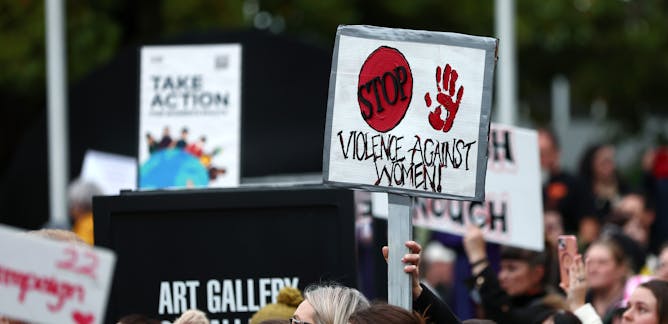
Articles on Pornography
Displaying 1 - 20 of 146 articles

Public focus on, and anger about, the horrifyingly high rates of violence against women is at fever pitch. What have the country’s leaders agreed to, and will it fix the problem?

As AI tools for image and video generation become more widely available, this will have impacts on the production of pornography.

British writer Angela Carter was a creative trailblazer. And in 1979, she published a book attempting the near impossible, claiming Sade –pornographer and literary bad boy – as a proto-feminist.

Deepfake pornography raises questions about consent, sexuality and representation. The issue is more complicated than online misogyny — new criminal laws are not our best response.

Whether deliberately seeking it out or finding it accidentally, most young Australians have seen pornography by the time they are 20, with potentially damaging consequences.

People in their 20s and 30s are more likely than any other age group to experiment with AI pornography.

Chances are, your teenager has already seen online porn. How should you respond if you find out they are watching it? What conversations should you be having with young children to prepare them?

Understanding how deepfakes can be used as a tool for misogyny is an important first step in considering the harms they will likely cause, including through school cyberbullying.

Distinct from civil disobedience, this legal strategy demands complete compliance with the law – even when there are loopholes that the laws’ creators didn’t intend.

A vocal minority is calling for sexuality education to be pulled from schools. But my research shows many parents and young people want and need safe places to discuss relationships and sex.

OnlyFans, Pornhub and cams: in this new world of digital pornography, how do we work out what’s healthy?

Twelve states do not require sex education of any kind.

Yumi Stynes and Melissa Kang’s sex education guide for teens is a topic of hot debate for its frankness. It also provides comprehensive, inclusive sex education that combats misinformation.

The outrage misdirected at Lolita – and its author – does nothing to negate the realities it reflects. Reading Nabokov’s novel now raises questions about censorship, book banning and human nature.

In focussing on individual “deviancy”, we fail to make the connection between misogyny and wider social problems, like pornography.

An expert on adolescent sexuality weighs in on how technology has changed the amount and type of pornography that teens can consume – and what that means when it happens at school.

Nona Willis Aronowitz, daughter of a second-wave feminist, ranges across the contemporary sexual landscape – and looks back at the history of feminism – in a ‘zig zag pursuit of sexual liberation’.

The son of the director has argued that Americans are still too squeamish about sex to fully appreciate the film. A porn scholar disagrees.

Clive Hamilton’s memoir of 40 years in activism is most of all a narrative of ideas in action. He argues for the power of provocation – and against the left, the right and China.

Movies carrying the NC-17 rating have traditionally been difficult to screen and promote, as they were locked out of some movie theater chains and traditional advertising.
